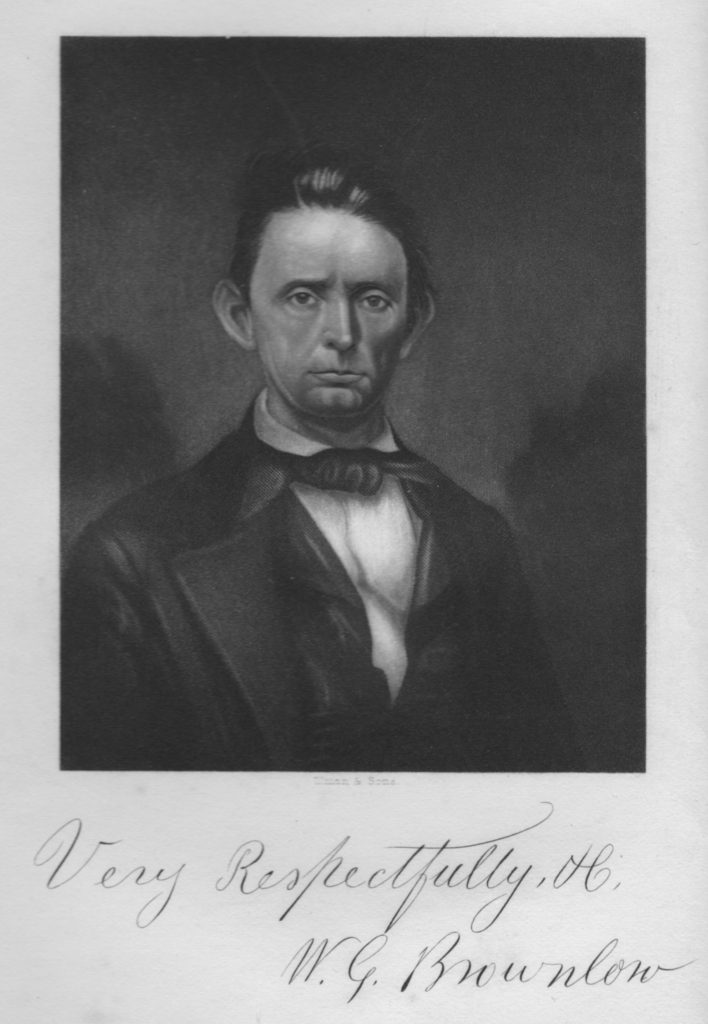I just subscribed to a new (to me) newspaper service, Accessible Archives which has a fairly large collection of African-American newspapers. I was very surprised that the first article to come up when I put in “Brownlow” was a very favorable obituary of W.G.B.! It was printed in the Christian Record, published by the A. M. E. Church in Philadelphia. It is illegible toward the end of the article but most of it can be read. I say it is “very favorable” because looking at other articles from the newspaper in previous years, it is clear they were very familiar with Brownlow’s racist views.
‘REQUIESCAT IN PACE.”
Hon. Wm. G. Brownlow, died at his residence, Knoxville, Tennessee, on the 29th ult. He had been for ten years incapacitated (by paralysis) for business pursuits.
The above distinguished gentleman, was a prominent member of the ME church and maintained his Christian character till his death. His last words were, “l am almost gone follow my example.” In his conversations with his pastor, he was resigned, and expressed himself as being prepared to depart this life, when God saw fit to call him. Gov. Brownlow was born in 1805, in Wythe Co., Va. During his early days his advantages were limited, nevertheless by perseverance, and his implicit faith in God, he succeeded in becoming a distinguished gentleman. He was a successful traveling clergymen of the M.E. Church, ten years. This field he afterwards left to become a journalist. In 1839, he published and edited The Whig, in Elizabethtown, Tennessee, but within a few months removed his paper to Jonesboro. In 1849, he removed to Knoxville Tennessee, where up to the time of his death he resided.
He edited and published the Knoxville Whig; until the war, when he suspended. The Whig was universally beliked. When the war broke out Gov. Brownlow exposed the cause of Freedom, for which he was arrested by the Southerners on a charge of treason and incarceration in the Knoxville jail. The confinement ruined his health. He again resumed the publication of the Knoxville Whig, and subsequently was elected to the U.S. Senate. ~~and then it is too mangled to read.

Another article I found was Frederick Douglass’ review of OUGHT AMERICAN SLAVERY TO BE PERPETUATED? A Debate between the Rev. W.G. BROWNLOW, and Rev. A. PRYNE, held at Philadelphia, September. 1858. Which is the publication of their debate speeches. The picture below is the picture used for the book.
What, dear reader, do you think Mr. BROWNLOW can have said in affirmation of such a proposition? Where do you suppose he went in search of arguments in favor of the endless perpetuation of American slavery?— By what torture of words, by what perversion of principles, by what distortion of facts by what complications of logic, by what mystifications of truth, by what selfish appeals to pride, prejudice, ignorance, superstition, brutal lust, love of power, could he have maintained a proposition so hell black and shocking? Does he appeal to God or man? Does he consult the celestial or the infernal regions for data? Then, personally, how bears he himself? Is he meek, lowly and persuasive, or bold, insolent and defiant? Does he behave like a man, or like a monster? Does he at any time, in this debate, assume the outward seemings of piety? or does he uniformly appear the open, undisguised, bare-faced child of the devil, we should look for in this slaveholding, man stealing and God-defying business? All these, and a thousand other questions, are fully answered in the volume of three hundred pages now before us. You have heard of speaking likenesses. This book contains one of these rare specimens of art.— BROWNLOW is here to the life. There is not a line wanting to convey an adequate idea of his character. A glance at his picture is enough. Here is the man and his place. You will not soon meet with a fitter illustration of SWEDENBORG’S doctrine of correspondence. Tarry a little. His compressed lips bespeak the assinine quality of firmness in a large measure. His rigid wrinkled chin, too small to support his apish cheek bones, give him something of the amiable expression of an hyena. But just cast a glance at those ears! They stand out from his head like the cropped ears of a butcher’s bull dog. If the fellow means to scare the whole North, by making people believe he has something terrible in his composition, his putting his picture in this book is an apt device. Can this be BROWNLOW’S? Why, he looks like a miserable negro driver. It wears the exact expression you would look for in the face of a brutal overseer, in the act of hanging up the blood-stained whip, after having laid forty stripes save one upon the bare back of a helpless woman! There is all the muscular enlargement, the expression of satiated ferocity, which might be looked for in the face of such a fiend. The eyes and forehead are the only redeeming features of this horrid face.— There is no lack of brain, and no lack of mental activity; but mercy, what a queer combination the whole presents!Nevertheless, on reading Mr. BROWNLOW’S speeches, before us, we are bound to confess that he has made the very best defence of slavery to be met with any where within our knowledge. He has well considered, and successfully embodied the South-side view of the subject. If he has failed, it has not been for want of zeal or industry, or the steadfast purpose to succeed. His non-success must be attributed to the cause, not to the man. He made the best of a bad cause.

